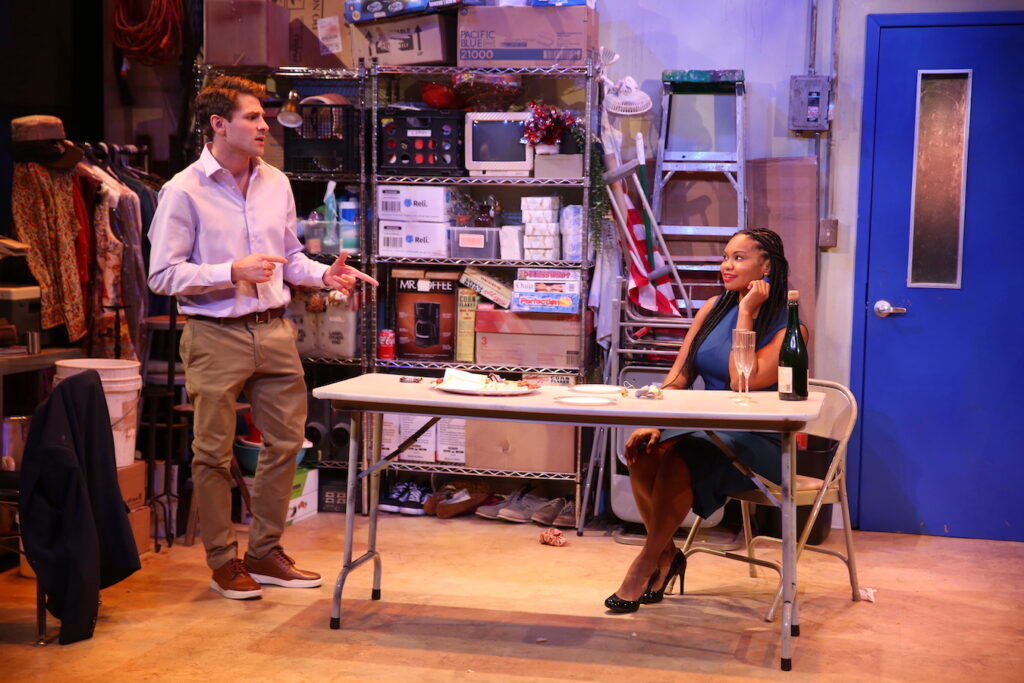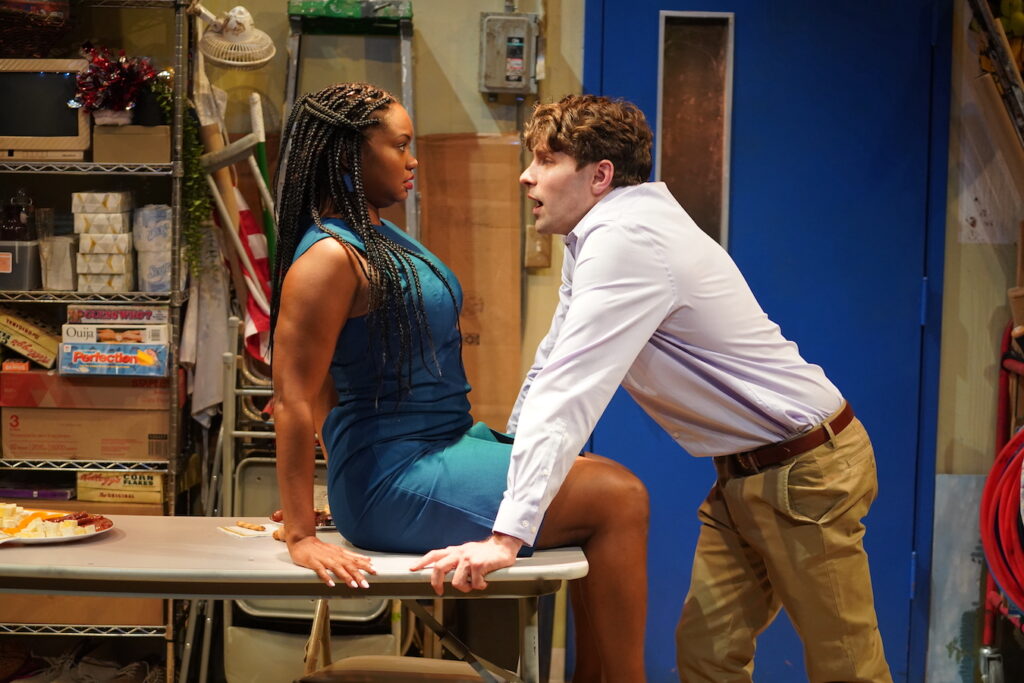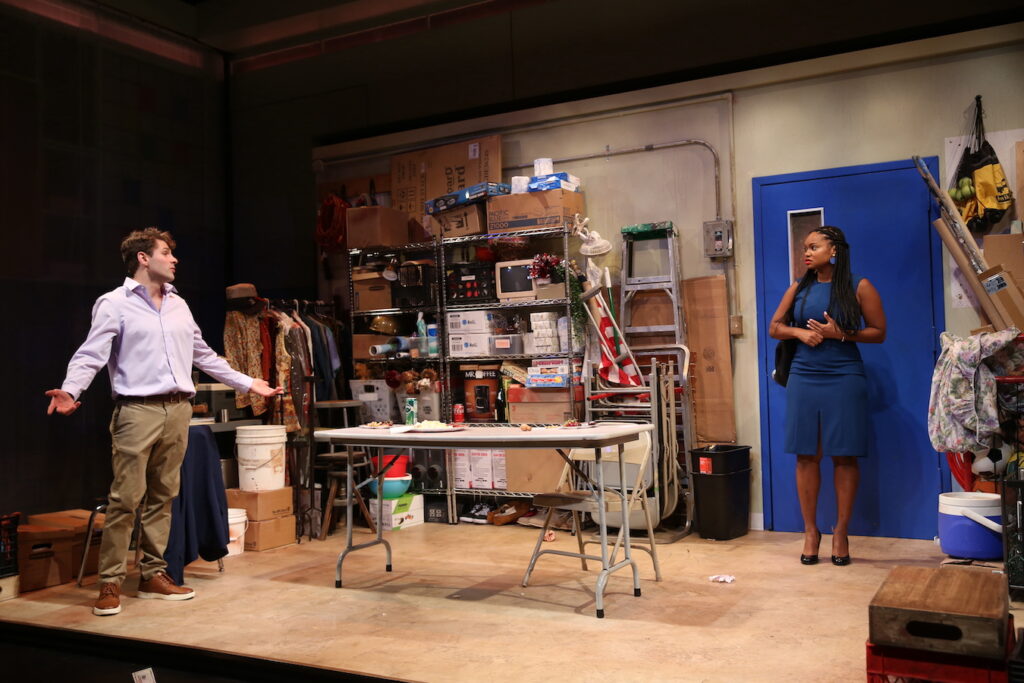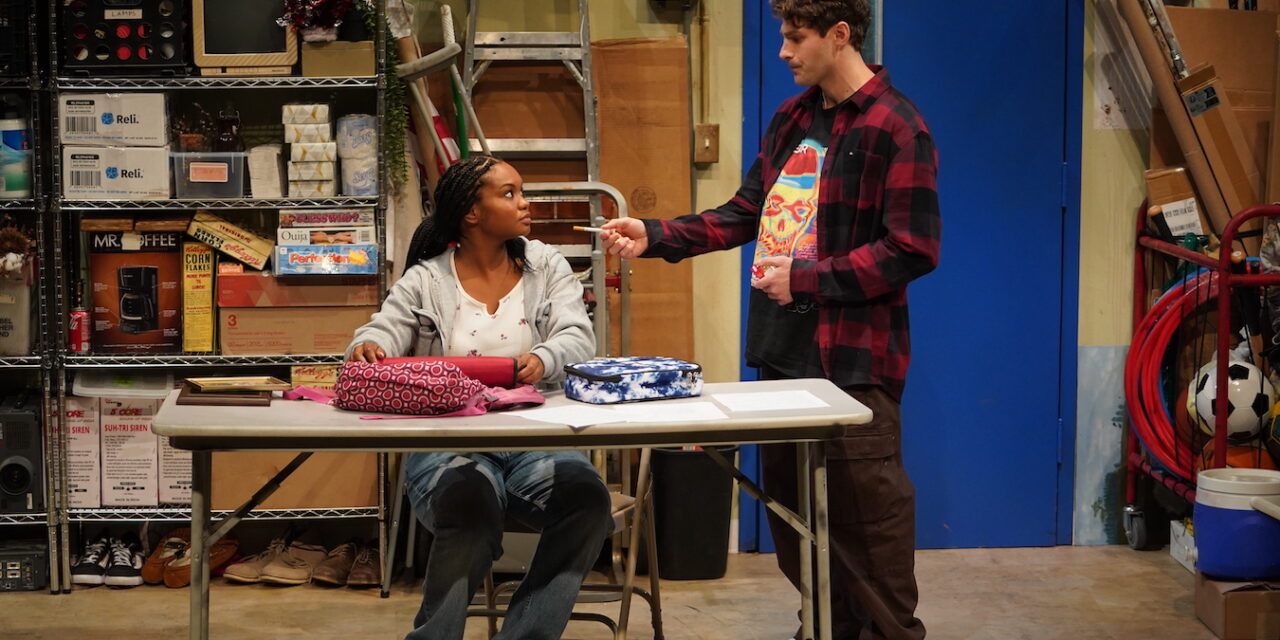By Samuel L. Leiter . . .
Despite its title, don’t expect Bite Me, Eliana Pipes’s new Off-Broadway play at the WP Theater, to be about vampires (although there actually is a 2019 vampire movie by the same name). Whatever the reason for calling it Bite Me, words never mentioned in the script, this talky, intermissionless, 90-minute play is a more or less conventional, moderately engaging, two-hander dramedy with a relatively familiar premise: in 2004 a pair of high school students, each somehow fractured, establish a potentially romantic but ultimately disappointing relationship; 10 years later, in 2015, we meet them at a class reunion where they, and the power dynamic controlling them, have changed radically.
Except for a small number of brief scenes acted on the set’s perimeter, the location throughout is a school building’s storage room (realistically designed by Chika Shimazu and effectively lit by Lucrecia Briceno). It’s filled with the usual paraphernalia of such places—extension cords, cleaning materials, and a wide assortment of random items accumulated by a busy prop master. Two students, a girl and a boy, discover that each considers this their secret lair. She has a right to be there (as her key proves); he uses a Swiss Army knife to get in.

The girl is Melody (Malika Samuel), the only Black girl in this otherwise all-white, rich kids’ suburban school (if you can believe that); a top student and high achiever, although something of a naïf, she commutes a long distance from the inner city for the school’s advantages, earning money—and straining belief considering what it took to enroll here—doing her white classmates’ homework. The guy is Nathan (David Garelik), one of her customers, a self-destructive bad boy from a privileged, but neglectful family. He has a penchant for theft, and his loot—like a teacher’s plaque—is taken more for fun than profit. He stashes the stuff in the storage room, into which nobody but our two characters ever wanders. Nathan’s cash-filled wallet, however, comes from drug dealing.
Nathan, who likens himself to James Dean, introduces the innocent—but eager-to-learn—Melody (who’d never heard of James Dean), to such worldly things as cigarettes, liquor, and weed; a sexual attraction exists but remains limited to close encounters. As new scenes of small talk arise, the pair gossip, argue, confess personal weaknesses (she cheats), throw shade on other students, and introduce their presumed outside romantic interests. Nathan favors crassness, even asking Melody: “Are you fucking anybody?”


Melody’s garments (Sarita Fellows did the costumes) gradually show an attempt to catch Nathan’s eye, while he, full of himself and his adventures, remains cocooned in his grunge Nirvana t-shirt (with requisite flannel partner) and baggy, brown cargo pants. When he tells Melody that a boy she likes “dresses like a d-bag,” you want to make him look in the mirror. The actors, way past their acne years, work hard to emulate the mannerisms of these adolescents. My plus-one, a retired high school teacher, pegged their behavior as accurate; it seemed a little forced to me.
Melody fears falling back into the world from which she’s trying to escape; Nathan’s own world starts to crumble. Melody struggles to overcome the confusion in their relationship; Nathan, seriously disturbed for reasons only vaguely expressed, and unwilling to publicly demonstrate his relationship with Melody, angrily explodes at her when prodded. Her feelings are seriously hurt as she, the school’s sole Black student, feeling like an outcast, expected him to be her main support. Oddly, issues of race barely arise, and it’s never clear whether we’re to assume that they’re the tinder lighting the emotional fires that sometimes erupt.
A decade later, Melody is ready to confront Nathan. They meet up again in the storage room during a class reunion, she now a well-paid junior executive, dressed to kill in a form-fitting blue sheath and sleek black spikes. He’s a restaurant line cook, in khakis, a loosely knotted tie (soon discarded), and blazer (quickly removed). Weirdly, from the looks of it (the same scraps of paper from the last scene are still littering the floor), no one has been in this room the entire time.


Each character has brought something from the catered affair outside with which to celebrate their reunion: he hors d’oeuvres, she champagne. He knows of her success from the internet; she must learn about him since he’s not on social media. Nathan, having cleaned up his act (drinking included), wants to apologize for his past behavior; but when Melody realizes this is likely because of his 12-step program, she doesn’t want to hear it. She needs something more substantial, which he struggles to provide.
Despite the characters’ greater maturity (the gap between their older and younger selves strains credibility), the conversation keeps shifting from amicability to tension and back, each new twist seeming more a playwriting ploy to give Melody a spine of feminist agency than something organic and necessary. Then, following a moment of sudden but unconvincingly interrupted passion, Nathan makes a proposal that tosses all believability away. As the final curtain nears, the characters’ responses become increasingly problematic and we begin to slyly spy our watches.
Under the efficient direction of Rebecca Martínez, and supported by Tosin Olufolabi’s excellent sound design, Garelik and Samuel bring enough conviction to their complex roles to maintain our basic interest. However, for all the apparent realism of their dialogue and behavior, Melody and Nathan never rise to memorable character heights, nor do their crises prove affecting, pertinent, or convincing enough to make us care deeply about them. And since too much of the play depends on our willing suspension of disbelief, it’s hard to recommend you follow the instructions suggested by the title.
Bite Me. Through October 22 at the WP Theater (2162 Broadway at West 76th Street). www.wptheater.org
Photos: Carol Rosegg


















